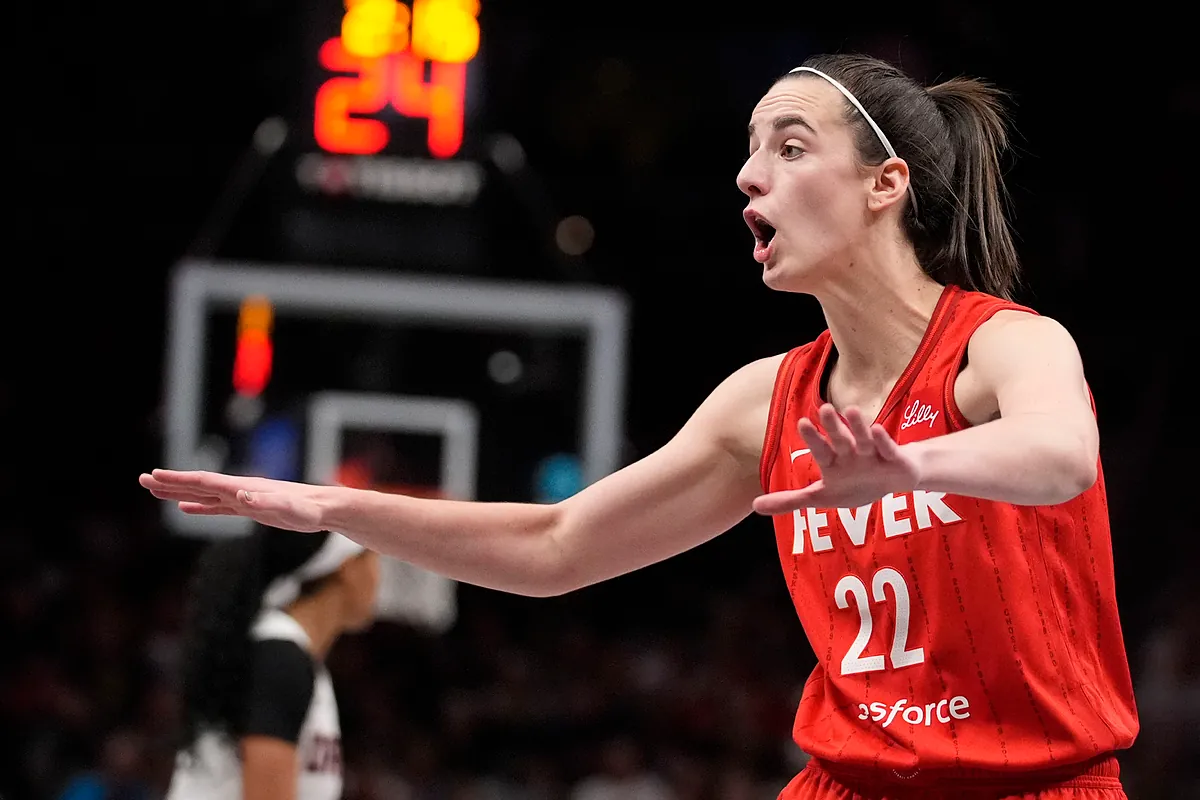An Incendiary Rookie’s Fierce Spirit: How Caitlin Clark’s Intense Exchanges with WNBA Officials Could Define Her Season
Caitlin Clark’s entry into the WNBA has been nothing short of a seismic event, transforming the league’s viewership and fan engagement in ways previously unimaginable. Yet, alongside the electrifying passes, deep three-pointers, and record-breaking performances, a recurring theme has emerged: Clark’s often contentious relationship with game officials. This dynamic, characterized by visible frustration and animated discussions, has quickly become a defining subplot of her rookie season with the Indiana Fever, raising questions about its potential long-term impact on her relationship with referees and, by extension, on her team’s trajectory.
From her very first moments on a WNBA court, Clark has demonstrated an undeniable competitive fire. This intensity, a hallmark of her collegiate career, has translated into a consistent inclination to voice her displeasure with calls, or lack thereof. Whether it’s a perceived uncalled foul, a questionable travel violation, or a seemingly missed defensive infraction, Clark has made it clear that she intends to advocate for herself and her team. This assertiveness, while admirable to many fans who see it as a testament to her passion, has undeniably put her squarely in the crosshairs of the officiating crews. Instances of her throwing the ball against the stanchion in frustration, or engaging in prolonged verbal exchanges with officials, have become viral moments, dissected and debated across social media and sports commentary shows.
The WNBA, like any professional sports league, has its own unique officiating nuances and personalities. Rookies typically navigate a period of adjustment, learning the rhythm and unwritten rules of the professional game, including how to interact with referees. However, Clark’s approach seems to be one of immediate engagement, a direct carryover from her college days where her protests, often flamboyant, were a regular fixture. While this unbridled expression might have been tolerated, or even celebrated, in the collegiate ranks, the WNBA operates with a different level of scrutiny and accountability. The league has clear guidelines regarding player conduct towards officials, and a string of technical fouls can lead to suspensions, directly impacting a team’s performance.
Indeed, Clark has already accumulated a notable number of technical fouls in her nascent WNBA career, even picking one up in a preseason game for visibly reacting to a call that she felt was incorrect. This early accumulation signals a potential pattern that could prove costly as the season progresses. While preseason technicals don’t count towards the regular season limit of seven before a suspension, they establish a precedent and a perception among the officiating body. Referees, like players, are human, and sustained displays of frustration, however justified in the player’s mind, can inevitably strain a working relationship.
The implications of this burgeoning tension are multifaceted. For the Indiana Fever, a team still finding its footing and relying heavily on Clark’s offensive prowess, every technical foul represents a free throw for the opposing team and a potential loss of their star player for critical stretches or even entire games. This can be particularly detrimental in tight contests where every possession and every point matters. Furthermore, a perception that Clark is prone to arguing with officials might subtly influence how certain calls are made in close situations. While officials are trained to be impartial, consistent argumentative behavior from a player, whether warranted or not, could lead to less favorable treatment in marginal situations.
Beyond the immediate on-court consequences, there’s the broader narrative. Clark is arguably the most recognizable face in women’s basketball, and her actions are under an unprecedented microscope. The way she interacts with officials sets a precedent, not just for her own career, but also for how younger players and aspiring athletes view the game and its authority figures. While passion is a cornerstone of competitive sports, there’s a delicate balance to be struck between advocating for oneself and disrespecting the integrity of the game and its officials.
Some argue that Clark’s outspokenness is a necessary byproduct of her competitiveness, a relentless drive to win that manifests in challenging every call. They believe that this fiery spirit is part of what makes her so captivating to watch and that a more subdued Clark would be a less effective one. Moreover, there have been instances where the officiating in certain WNBA games has drawn criticism from coaches and analysts, lending some credence to player frustrations. However, even if calls are missed or appear inconsistent, the manner in which a player expresses disagreement can either open a dialogue or shut it down.
The responsibility for navigating this relationship doesn’t solely rest on Clark’s shoulders. The Indiana Fever coaching staff, led by head coach Stephanie White, will undoubtedly play a crucial role in helping Clark temper her reactions while maintaining her competitive edge. It’s a fine line to walk. Encouraging a player to channel their frustration constructively, perhaps through more measured conversations during timeouts or by allowing the coaching staff to handle direct complaints, will be vital. The team’s veteran players also have a role to play in guiding Clark through the complexities of professional officiating.
As the season progresses, the development of Caitlin Clark’s relationship with the WNBA officiating crew will be a storyline worth monitoring closely. Will she adapt her approach, finding a way to voice her concerns without consistently incurring technical fouls? Or will her fiery temperament lead to a season-long battle with the whistles, potentially impacting her availability and the Fever’s overall success? The balance between passion and prudence, between challenging calls and respecting the game’s authorities, will define not only her individual performance but also the narrative of her highly anticipated rookie year. The stakes are high, and the spotlight is unblinking. For Caitlin Clark, taming the occasional eruption of frustration might be as crucial to her success as hitting a clutch three-pointer.



